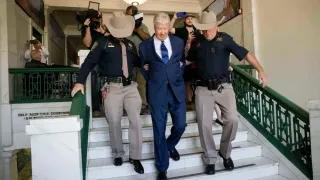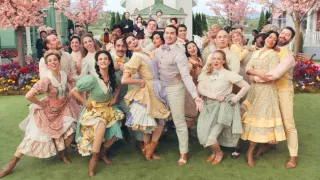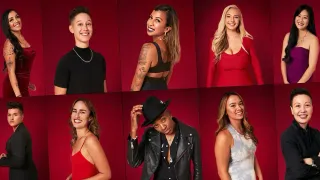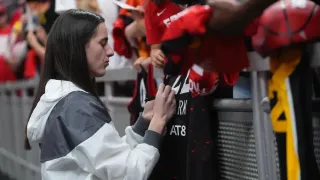March 20, 2015
Program Brings LGBT Seniors Together
Kilian Melloy READ TIME: 5 MIN.
Jasmine Gee first began visiting Felicia Elizondo on a weekly basis nearly two years ago. Their Monday morning get-togethers can consist of simply watching trashy TV shows together or walking Elizondo's two canine companions or going on excursions around town or once to a North Bay casino.
"We are not high rollers," joked Gee, 66, noting the women limited themselves to betting just $20.
For Elizondo, 68, who lives in a one-bedroom apartment in the Lower Haight with her dogs Gypsy Rose Lee, a black Pomeranian mix, and Simon, a mixed breed cocker spaniel, the visits ensure at least once a week she has a social outlet.
"Seniors get very lonely. I don't drink no more. I don't smoke. There is no reason for me to be at the bar scene, that is just not who I am now," said Elizondo. "Jasmine has an attitude of live and let live. She is just a good listener and a person to communicate with. Sometimes I just need someone to be there to sit and watch TV. We don't have to talk."
The pair teamed up through the Friendly Visitor program operated by Openhouse, the San Francisco-based agency that provides services to LGBT seniors. The transgender women of color initially had met through their activist work, so when Elizondo, who is Mexican-American, saw that Gee, who is of Chinese descent, had volunteered to be a visitor, she requested that they be matched.
"I thought I could teach her a few tricks," joked Elizondo. "We are two different nationalities and sometimes we butt heads together. But we always come out being friends."
Just as rewarding for Gee, who had been married to a woman and came out as transgender in 2000, is being able to discuss their shared experiences.
"It's very enjoyable because although I connect with a lot of different communities, straight as well as LGBT, I am with one of my own," said Gee. "As seniors we mutually learn from each other and mutually help each other. It's a dual role. I love to step back and hear her bits of wisdom."
To which Elizondo jokingly responded, "And I have a lot of it."
Openhouse assumed oversight of the visitor program five years ago after the collapse of the LGBT mental health agency New Leaf: Services for Our Community. The goal is to foster personal connections between LGBT seniors, many of whom live alone, with other members of the LGBT community.
While some older adults may mistakenly view it as a babysitting service for seniors - or someone to run errands for them - in actuality it operates more like a pen pal program come to life.
"Often, as we age, folks tend to isolate themselves or it just gets more challenging to get out. The benefit here is a volunteer visitor goes to their home and gets them out of their home," said Michelle Alcedo, Openhouse's?director of programs. "For us, we are shifting how we talk about the program to emphasis it is more of an empowerment model. It is much more egalitarian in terms of both parties have something to contribute."
As a sub-grantor of the Family Caregiver Alliance, Openhouse receives $20,100 in Department of Adult and Aging Services funding to help cover the costs of the visitor program. Additional funding is allocated through a DAAS community services contract Openhouse was awarded.
Thirty seniors are currently matched with visitors, whose ages range from their mid-20s to early 70s. Two participants have been matched with same-sex couples, while 10 volunteers are waiting to be teamed up with a senior.
Looking for Seniors
Openhouse, which is looking to hire someone to oversee the program due to a staff departure, would like to double the capacity by the end of the year so that up to 70 seniors are matched with friendly visitors.
"We are always looking for more seniors to be visited," said Alcedo.
Any San Francisco LGBT adult age 60 and older is eligible to sign up for the program. An Openhouse staff person will then conduct an assessment at their home, which can take between 90 minutes to two hours, to determine their interests and preferences in terms of a visitor.
Visitors are required to attend a four and half hour training, held at least once quarterly, that covers myriad circumstances they may encounter.
"We want to ensure we try our best to gather as much information about the senior and volunteer to be able to make a thoughtful match," said Alcedo.
Once matched with a senior, volunteers are asked to visit them at least twice a month, though many meet on a weekly basis. Those who become friendly visitors also are asked to attend monthly support group meetings.
"They brainstorm strategies for how to increase connection or how to support a senior who perhaps is experiencing grief. Or they discuss how they themselves are experiencing grief due to the declining health of the community member they see," explained Alcedo. "We are now seeing folks who were matched with people for a number of years going through the grieving process because they are loosing essentially a friend and someone very meaningful to them."
Marc Tosca, 73, signed up for the program last year in order to force himself out of his home. Tosca, who moved to San Francisco in 1970, lost many of his gay friends to AIDS in the 1980s, and those who survived the epidemic are now dying from ailments that come with old age.
"I am rather reclusive," admitted Tosca. "I no longer participate in activities."
Since last summer he has been getting together on a regular basis with Dan Kreiter, 36, and Paul Towne, 39, a married couple who moved to San Francisco three years ago. They will grab a cup of coffee together or take in a theater show.
"We wanted to do something where we developed a relationship with someone in the community," said Towne.
Hearing Tosca talk about his experiences during the early decades of the LGBT rights movement, Towne said he and his husband "feel a part of the city and the history."
The other benefit from going on outings with Tosca, added Towne, "is that in some ways we are exploring the city together."
Tosca sees his being matched with a younger couple as honoring the older gay men he befriended in his youth.
"For me it is coming full circle. When I was young I hung out with older people who were not my peers. Now it is reversed," he said.
Anyone interested in the program, whether seniors or visitors, can call Alcedo at (415) 728-0195 for more information or email mailto:[email protected]






